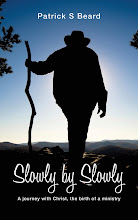 He That is of God Hears God's Words
He That is of God Hears God's Wordsby James Tissot (Art.com)
Never one to shy away from controversy -- my question today is what (or who) is the Word of God?
My brothers at the largest Baptist church in Memphis have erected a 20' statue of the Bible in the foyer of the church. These same brothers would rightly proclaim that a statue of Mary in the church at Fatima, Portugal is an idol. However, just like the faithful Portuguese Catholic that erected the statue of Mary they too are blind to the fact that they have made an idol of the Bible. It is Bibliolotry.
Growing up Baptist I was taught that the Bible is the Word of God. Many proof texts support this claim (and for regular readers of the Bishop's Beard you know how I loath proof texts). However, a reading of many of these proof texts in their context prove that this proclamation is not correct. Hebrews 4:12 was a memory verse in VBS (Vacation Bible School) and a favorite verse to find at Bible "Sword" Drills. "For the word of God is quick, and powerful, and sharper than any two edge sword, piercing even to the dividing asunder of soul and spirit, and of joints and marrow, as is a discerner of the thoughts and intents of the heart." Sounds like the Bible is a powerful sword, unless you read this same verse in its context and see that the entire passage is about Christ, not the Bible. Because Jesus is the Word of God He is also the Great High Priest that discerns the thoughts and intents of the heart. Romans 8 proclaims that the Spirit of God is the One who searches hearts and makes intercession for us.
After preaching at a Presbyterian church I was gently rebuked for preaching the hope of seeing Christ "face to face" as though it was a future event. I had made reference to I Corinthians 13 where our hope of Resurrection ("...when that which is perfect has come...") is hope for a physical event where we will know Christ as intimately as He now knows us. I was told that the "Perfect" in this passage is the Bible, which has already come so that we can know Christ through His word. Knowledge, tongues and prophesy have all been done away with because we now have the Bible. The problem that I have with this interpretation (other than the fact that it is wrong) is that the Bible does not contain every word of Christ (John 21:25), and I don't know how many hairs He has on His head, much less can I see His face or look into His eyes. The Christian hope is that we will be physically resurrected and we will know God like He knows us.
I understand what the fundamentalist is trying to do when he says that the Bible is the word of God and the final authority for life and faith. He is trying to distance himself from the charismatic chaos of modern times and the "Christian" cults who have extra Biblical "scripture" and anti-Christ "revelation". The problem is that interpretation of Scripture can vary greatly, so how then is the Bible the "Final Authority?"
I am always looking for balance. I think the balance in this issue is simply that we must look to the whole counsel of Scripture, which contains the written revelation of the Word of God, for instruction in life and faith. Certainly the Bible is the bench mark by which all revelation, prophesy and tongues should be judged. The Bible is a way to know about God. The Apostles gave us timeless instruction in how we should live. The prophets foretold Christ, and Christ revealed the Father to us. Ultimately it is by faith that we know Him, and His Spirit lives within us aiding us as we struggle to know, understand and comprehend the depth, width and height of His love.
There is no doubt that the Bible contains the words of God. But, Jesus IS the Word of God.




.jpg)
1 comment:
Elevation of the Bible is a very Protestant thing, but it goes back to the Reformers to some extent. I think a lot of it started with Sola Scriptura and Luther, in reaction against religious tradition being held as authoritative as scripture. But over time, like most things, the counter-balance of returning to scripture tilted too far to what you called "biblolatry."
This is a difficult topic, because even if one says Jesus is the Word of God, the Bible (as scripture) could be said to be the words of Christ, so we're sort of back to square one.
Nice thought provoking article.
Post a Comment